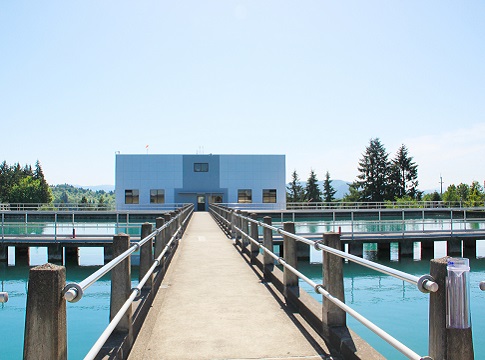Related News
Related News
-
EWEB Communications Win National Recognition for Public Power Excellence
We’re excited to share that EWEB has again been honored with two Excellence in Public Power Communications Awards from the American Public Power Association (APPA), earning top honors in both the Web/Social Media and Video categories.
Find Out More -
Spill Drill 2024: EWEB & partners practice containing hazardous materials spills on McKenzie River
EWEB coordinates the drill as part of our work to protect the McKenzie River – the source of drinking water for more than 200,000 residents of the Eugene metro area.
Find Out More -
Imagine a Day Without Water 2024
Learn how you can prepare for an extended water outage.
Find Out More -
“We're just surrounded with people who are really helpful."
Michele Victor lost her home, septic system, and two cats to the fire. But thanks to EWEB's Septic System Repair and Replacement Grants, she is one step closer to rebuilding her home.
Find Out More -
EWEB Partners with the City and YMCA to Celebrate New Amazon Park Emergency Water Station Site
Hundreds of attendees practiced filling up water containers at Saturday's demonstration event.
Find Out More -
Source Water Protection Week: Our Commitment to Clean Water
EWEB celebrates our community's commitment to protecting the McKenzie River, the source of Eugene's drinking water.
Find Out More -
EWEB Communications Team Wins Top Awards at Northwest Innovations in Communications Conference
Competing against public utilities from across the region, EWEB brought home two significant awards in recognition of our work to engage and inform the community.
Find Out More -
September is National Preparedness Month: 3 tips to prepare your home & family
Let's "Be Ready" together!
Find Out More -
EWEB invests in preparedness for severe weather and natural disasters
Just as you take steps to safeguard your home and family, EWEB is investing in equipment and processes to ensure our community’s electric and water systems remain reliable in the face of adversity.
Find Out More -
EWEB, SUB and RWD join forces at Lane County Fair to distribute water to fairgoers
The Eugene Water & Electric Board, Springfield Utility Board and Rainbow Water District are teaming up for the 9th year to provide fairgoers with clean, cold free water.
Find Out More -
EWEB prepares for rising energy demand as weekend heat wave arrives
Electricity supply is sufficient for now, but new supplies will be necessary in the years ahead to keep pace.
Find Out More -
EWEB bids a fond farewell to College Hill Reservoir and prepares for modern drinking water storage tanks
Several hundred Eugene residents came together on May 30 for a Farewell Celebration at EWEB’s College Hill Reservoir before demolition and construction to build modern drinking water storage tanks begins later this year.
Find Out More -
EWEB invests in satellite-based forestry analytics for vegetation management
EWEB maintains over 1,300 miles of overhead transmission and distribution lines. To aid crews in identifying hazardous vegetation growth in a sometimes heavily forested service territory, EWEB is utilizing a new satellite-based forestry analytics software called Overstory.
Find Out More -
Drinking Water Week 2024
This week, we celebrate the value of clean, safe water, the importance of water infrastructure, and the critical role of water professionals.
Find Out More -
The Big Freeze 2024: After Action Report
Winter 2024 was one for the records books, and we'll look back on it for years to come and say, "That was a doozy!" The back-to-back January Ice Storms caused widespread damage to EWEB’s service territory, affecting approximately 38,000 customers. Preliminary repair costs were over $8 million, and additional repairs to transmission lines are still required.
Find Out More - Show More
EWEB Water Filtration Plant is Ready for the Rain
September 17, 2020

With rain in the forecast, we wanted to update our customers about the capabilities of our Hayden Bridge Filtration plant when it comes to treating water from the McKenzie River amid the impacts of the Holiday Farm Fire.
Depending on the amount of rain, we can expect higher levels of turbidity (suspended particles including soil) and an increase in organic material coming from the burned and eroded landscape around and above the river.
The rain forecast for Sept. 17-19 along with the expected turbidity, stormwater runoff and organic carbon impacts, is well within the filtration plant's capability and capacity to handle.
The organic material is made up of ash and particles from burned vegetation and soil. Some portion of the organic material also dissolves into the river water and is called dissolved organic carbon. Our Hayden Bridge Filtration Plant treats and filters organic material, including dissolved organic carbon, using the powdered active carbon (PAC) and rapid sand filtration systems.
The PAC system works by adsorbing (attracting like a magnet) these organic material compounds to the carbon molecules. Once adsorbed to the PAC, the compounds are removed by the filtration process. Due to the increased organic material in the river, staff are having to wash and clean the filters more often in order to continue producing high quality drinking water.
We have two different types of instruments in the watershed and at the Hayden Bridge intake to monitor dissolved carbon levels in real time. This provides an early warning system to allow operators to prepare for and adjust treatment strategies prior to the river water entering the filtration plant.
In addition to using more PAC and cleaning the filters more often, staff are also adjusting the overall treatment process on an ongoing basis. We continue to monitor both the source water and treated drinking water to ensure its safety. Public health is our top priority as we strive to meet the expectations for reliable service to our community's homes and businesses.

